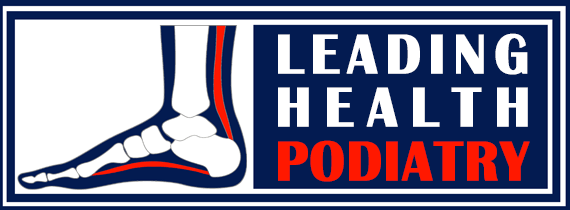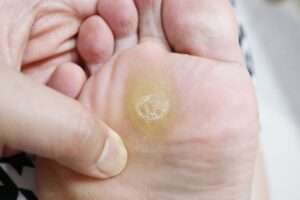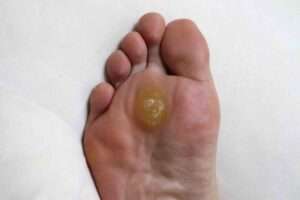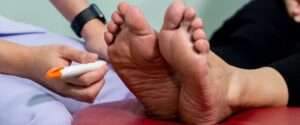Foot Corns and Callus
Corns and calluses are common foot conditions that can cause discomfort and pain if left untreated. While these growths are typically harmless, they can make walking and standing uncomfortable. At Leading Health Podiatry, we specialise in diagnosing and treating corns and calluses to ensure your feet stay healthy and pain-free.
What Are Corns and Calluses?
Corns are small, thickened areas of skin that develop on the feet, usually on the toes, due to pressure or friction. They often have a hard center and can be painful when pressure is applied. Corns are commonly caused by poorly fitting shoes, tight footwear, or abnormal foot mechanics.
Calluses are larger, thicker patches of skin that form on the soles or sides of the feet. Calluses develop as a result of repetitive friction or pressure from walking or standing. They are generally not as painful as corns, but they can become uncomfortable if they grow too thick.
Common Causes of Corns and Calluses
- Improper Footwear: Tight or ill-fitting shoes are one of the most common causes of corns and calluses. Shoes that don’t provide adequate support or have high heels can put extra pressure on certain areas of the feet.
- Abnormal Foot Mechanics: Conditions such as flat feet, high arches, or misalignment of the toes can cause uneven pressure distribution, leading to the development of corns and calluses.
- Repetitive Friction: Walking, running, or standing for long periods of time can cause repeated friction, especially on the feet’s weight-bearing areas, leading to callus formation.
- Foot Deformities: Bunions, hammertoes, and other foot deformities can result in uneven pressure on the feet, increasing the risk of corns and calluses.
Symptoms of Corns and Calluses
- Thickened, hardened skin on the feet
- Pain or tenderness when pressure is applied
- Bumps or raised areas, especially on the toes (corns)
- Dry, flaky skin around the affected area
- Discomfort while walking or standing
Treatment for Corns and Calluses at Leading Health Podiatry
At Leading Health Podiatry, we provide effective treatments for corns and calluses to relieve pain and prevent further complications. Depending on the severity of your condition, we offer a variety of treatment options:
1. Footwear Advice
Improper footwear is often the root cause of corns and calluses. We provide expert footwear advice, recommending shoes that fit properly and provide the right support for your feet.
2. Padding and Cushioning
We can recommend or apply special padding or cushioning to relieve pressure from the affected area, reducing discomfort and preventing further irritation.
3. Debridement and Removal
Our podiatrists can safely remove corns and calluses using professional techniques. Debridement (removal of thickened skin) is performed carefully to avoid injury and ensure the skin heals properly.
4. Custom Orthotics
For those with abnormal foot mechanics, custom orthotics can be prescribed to help distribute pressure evenly across the foot. This can help prevent the recurrence of corns and calluses.
5. Treatment of Underlying Conditions
If your corns or calluses are caused by an underlying foot deformity or misalignment, we may recommend additional treatments, such as stretching exercises, splints, or further assessment of foot mechanics.
6. Regular Foot Care
We provide ongoing advice and tips for foot care, helping you maintain healthy feet and prevent corns and calluses from returning.
Preventing Corns and Calluses
While some people may be more prone to developing corns and calluses, there are several steps you can take to reduce your risk:
- Wear Proper Footwear: Choose shoes that fit properly and provide adequate arch support. Avoid tight, narrow, or high-heeled shoes that cause friction and pressure on your feet.
- Moisturise Your Feet: Dry skin can make corns and calluses worse. Keep your feet moisturised to maintain soft, healthy skin.
- Check Your Feet Regularly: Examine your feet regularly for signs of corns or calluses, especially if you have diabetes or other conditions that affect foot health.
- Use Protective Pads: If you’re prone to corns or calluses, consider using protective pads or insoles to reduce friction.
When Should You See a Podiatrist?
If corns or calluses are causing significant pain, discomfort, or changes to the skin, it’s important to seek professional treatment. Additionally, if you have diabetes or poor circulation, it’s crucial to have any foot issues assessed by a podiatrist to avoid complications.
Book an Appointment at Leading Health Podiatry Today!
At Leading Health Podiatry, we are dedicated to providing expert care for corns and calluses. If you’re experiencing foot pain or discomfort from corns or calluses, don’t wait – schedule an appointment today and take the first step toward healthy, pain-free feet.



